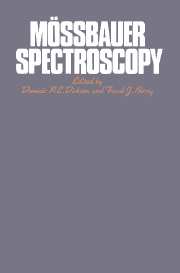Book contents
- Frontmatter
- Contents
- List of contributors
- Preface
- 1 Principles of Mössbauer spectroscopy
- 2 Mössbauer spectroscopy and the chemical bond
- 3 Mössbauer spectroscopy as a structural probe
- 4 Mössbauer spectroscopy of magnetic solids
- 5 Time-dependent effects and relaxation in Mössbauer spectroscopy
- 6 The dynamics of nuclei studied by Mössbauer spectroscopy
- References
- Index
6 - The dynamics of nuclei studied by Mössbauer spectroscopy
Published online by Cambridge University Press: 15 October 2009
- Frontmatter
- Contents
- List of contributors
- Preface
- 1 Principles of Mössbauer spectroscopy
- 2 Mössbauer spectroscopy and the chemical bond
- 3 Mössbauer spectroscopy as a structural probe
- 4 Mössbauer spectroscopy of magnetic solids
- 5 Time-dependent effects and relaxation in Mössbauer spectroscopy
- 6 The dynamics of nuclei studied by Mössbauer spectroscopy
- References
- Index
Summary
Introduction
The purpose of this chapter is to review the application of Mössbauer spectroscopy to the study of dynamics. The main emphasis will be on the new areas in which significant advances have been made in recent years, such as the study of diffusive processes, the influence of motion on lineshape, time-dependent studies and dynamics at phase transitions. Rather less attention will be devoted to areas such as f-factors in solids, the Goldanskii–Karyagin effect and temperature shift, which have been studied more extensively in the past. The trends towards future areas for this research will also be considered, together with an evaluation and comparison between Mössbauer spectroscopy and other methods for investigating these phenomena.
No attempt will be made to develop the formal theory of dynamics in this chapter. General physical arguments will be employed to describe the phenomena and the main theoretical results to be used in interpreting the experimental data will be summarised. Representative experimental data and results will be presented in the various sections.
The phenomenon of the recoil-free resonant absorption of gamma rays is the result of the special dynamics of nuclei in solids. This fact was recognised by Mössbauer, who interpreted his apparently anomalous observations in terms of lattice dynamics of a similar nature to those associated with neutron scattering (Mössbauer, 1958). He found that the recoil momentum of the recoiling nucleus is shared by many nuclei of the crystal and thus the recoil energy is extremely small.
- Type
- Chapter
- Information
- Mössbauer Spectroscopy , pp. 219 - 260Publisher: Cambridge University PressPrint publication year: 1986
- 10
- Cited by



